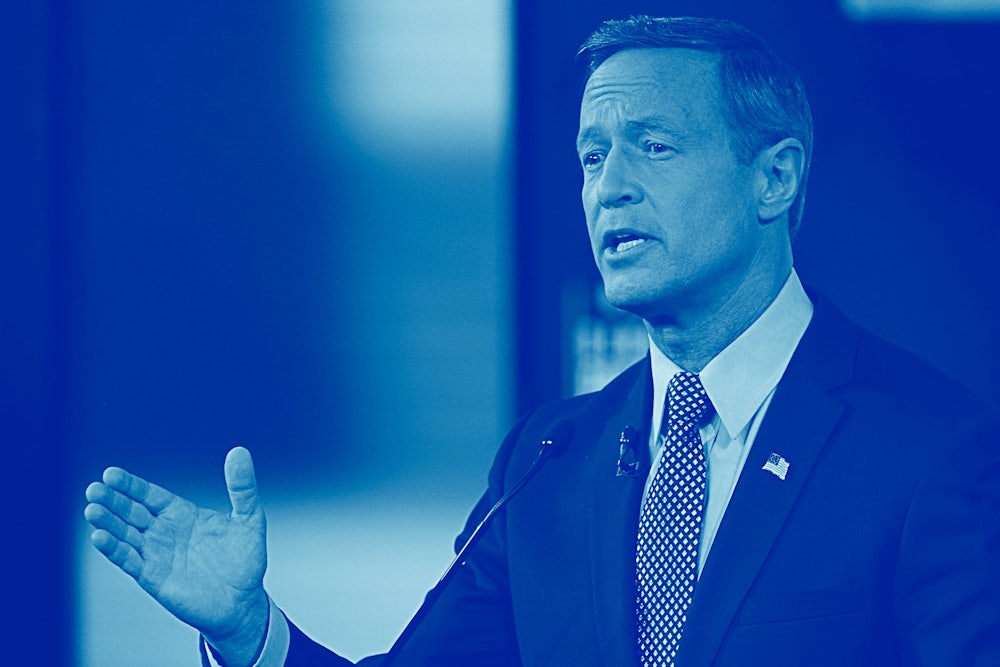The third Democratic debate, held in New Hampshire on Saturday night, was often a two-person debate plus a third wheel: Martin O’Malley who has been polling at a distant third behind his opponents and lags by some 40 points in New Hampshire. The former Maryland governor came to the stage ready to answer questions that never came his way and to pick a few fights to boost his struggling campaign.
His desperation led to some memorable moments. When the debate turned to gun control, O’Malley attacked Hillary Clinton and Bernie Sanders for representing a “flip-flopping, political approach of Washington.” Sanders replied, “Whoa, whoa, whoa. Let’s calm down a little bit, Martin,” and Clinton added, “Yes, let’s tell the truth, Martin.” Later, the audience booed O’Malley when he interrupted a discussion on ISIS with a jab about his opponents’ age, “May I offer a different generation’s perspective on this?” In one unfortunate prepared line, O’Malley referenced “the bickering back and forth” over the voter data scuffle—but just moments earlier, Clinton and Sanders had settled that matter. And ABC News moderators Martha Raddatz and David Muir repeatedly chided him for speaking out of turn.
In short, O’Malley didn’t look presidential. Yet there’s good reason to take him seriously, despite his awkward night.
O’Malley’s strategy throughout the campaign has been simple: to be the first candidate to stake out detailed, even wonky, progressive positions—with a focus on what a Democratic president can do despite a resistant GOP-led Congress. He released many of those plans in July, well before either Clinton or Sanders had rolled out policy specifics as official candidates.
O’Malley was the first candidate to come out with an in-depth immigration platform in July, one that the The Nation noted was “stunningly explicit.” It went beyond every Democrat’s endorsement of comprehensive immigration reform—a nonstarter in the GOP Congress—and instead looks at what more a president can do to ease the U.S.’s expensive reliance on detention centers. “Certainly compared to any of the other Democrats and all of the Republicans, [O’Malley’s platform] is so far more detailed and thorough than anyone else has been willing to express,” Beth Werlin, director of policy at the Immigration Policy Center, told The Nation. Five months after O’Malley announced his plan, Sanders released his own version that roughly matched O’Malley’s in ambition.
When the climate debate was still squarely focused on who did and didn’t support the Keystone XL pipeline over the summer, O’Malley released a comprehensive climate plan on the future of clean energy. It was a refreshing break from Clinton’s vague promises to release specifics about her climate plan, and Sanders’s one-liner about opposing the Keystone pipeline. O’Malley looked ahead, proposing a “zero-tolerance policy” for a potent source of greenhouse gasses—methane from natural gas—and expanding carbon regulations to “other large sources of emissions beyond power plants,” presumably meaning sources the Obama administration hasn’t comprehensively addressed, like agriculture and shipping.
Gun violence didn’t break into the Democratic debate until October, after a shooting at Umpqua Community College in Oregon. O’Malley proposed requiring fingerprint licenses for gun owners and a national gun registry. He laid out seven ideas for what a Democrat in the presidency can do to curb gun violence, including alerting police of failed background checks, prosecuting domestic abusers, and enforcing rules for licensed dealers.
The circumstances of the third debate weren’t favorable to O’Malley. Held on a Saturday night, just days before Christmas, it was hardly the ideal platform for introducing himself to more Democratic voters. Moreover, much of the debate focused on foreign policy rather than his strength, domestic policy—and when the debate did touch on the latter, it was light on some of O’Malley’s strongest issues.
But all is not lost. At one point during the latter half of the debate, O’Malley said, “I was flattered that Secretary Clinton two months later borrowed so many of my proposals to incorporate into hers.” The candidates were discussing debt-free college, but he could have been referring to any number of his proposals. You can hardly blame him for taking credit now, while he has the chance. After all, some of these policy proposals could become political reality, but he probably won’t be the one who’s implementing them.
